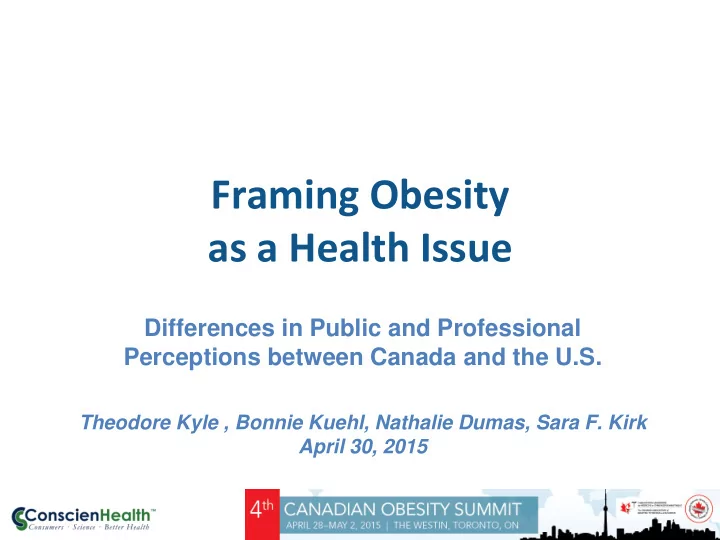

Framing Obesity as a Health Issue Differences in Public and Professional Perceptions between Canada and the U.S. Theodore Kyle , Bonnie Kuehl, Nathalie Dumas, Sara F. Kirk April 30, 2015
Faculty/Presenter Disclosure • Faculty: Ted Kyle • Relationships with commercial interests: – Grants/Research Support: Obesity Action Coalition – Speakers Bureau/Honoraria: none – Consulting Fees: 3D Communications, Eisai, EnteroMedics, Novo Nordisk, The Obesity Society – Other: none
Disclosure of Commercial Support • This program has received financial support from no one in the form of anything. • This program has received in-kind support from no one in the form of anything. • Potential for conflict(s) of interest: – Ted Kyle has received nothing from any organization connected with this presentation. – No products will be discussed in this program.
Mitigating Potential Bias • We have no commercial bias to mitigate in connection with this program.
Framing Obesity as a Health Issue Background
Pervasive Bias Hampers Clinical Care and Obesity-Related Policy • Blaming people “Our findings add to a growing body of literature living with obesity that challenges a number of widely held assumptions • Counterproductive about obesity within a health care system that is currently tension between unsupportive of individuals prevention and living with obesity .” clinical care – Kirk et al Qual Health Res, 2014 • Dysfunctional medical dialogue
Weight Bias Compounds the Harm of Obesity Obesity Unhealthy Health Behaviors Impact Healthcare Health Avoidance Care Weight Bias Source: UConn Rudd Center
Understanding External Causes of Obesity Plays a Role in Bias • People express bias when they perceive it as a choice • People reject bias when they understand the external causes of obesity Sources: Crandall, 1994; Crandall & Moriarty, 1995; Crandall et al., 2001; DeJong, 1993; Puhl, Schwartz, Brownell, 2005.
Study Objectives • Measure the prevalence of different perceptions of obesity • Look for potential differences – Between the U.S. and Canada – Between the public and healthcare professionals – Between French and English-speaking Canadians
Framing Obesity as a Health Issue Methods
Online and Smartphone Samples Obtained via Google Consumer Surveys Online Sample Smartphone Sample • 3,959 Total • 8,670 Total – 1,000 CA-Eng POP – 2,817 CA POP – 2,000 CA-Fr POP – 959 CA-Fr HCP – 3,850 U.S. POP – 1,000 CA HCP Note: HCPs include physicians, RNs, – 1,003 U.S. HCP dietitians/nutritionists, healthcare policy/mgmt
Questions
Framing Obesity as a Health Issue Results
The Canadian Public Views Obesity More as a Community Problem than the U.S. Canada United States Weighted Sample: n = 2,138 n = 2,540
French-Speaking Canadians Are Most Likely to View Obesity as a Community Problem French-Speaking English-Speaking Smartphone Sample: n = 2,000 n = 1,000
HCPs Hold Similar Views of Obesity in Both Countries Canada United States Weighted Sample: n = 576 n = 676
HCPs in Canada Less Likely Than Public to View Obesity as a Community Problem French-Speaking Canadians Public HCPs Smartphone Sample: n = 2,000 n = 959
Conclusions • Greater understanding of obesity as a community problem in Canada • Especially among French-speaking Canadians • Suggests greater appreciation for shared risks • May offer opportunities for more effective strategies • And for reducing bias
Thanks! Ximena Ramos Salas
More Information • www.conscienhealth.org/news • Facebook.com/ConscienHealth • @ConscienHealth • For these slides: http://conscienhealth.org/wp-content/uploads/2015/04/frame.pdf
Recommend
More recommend